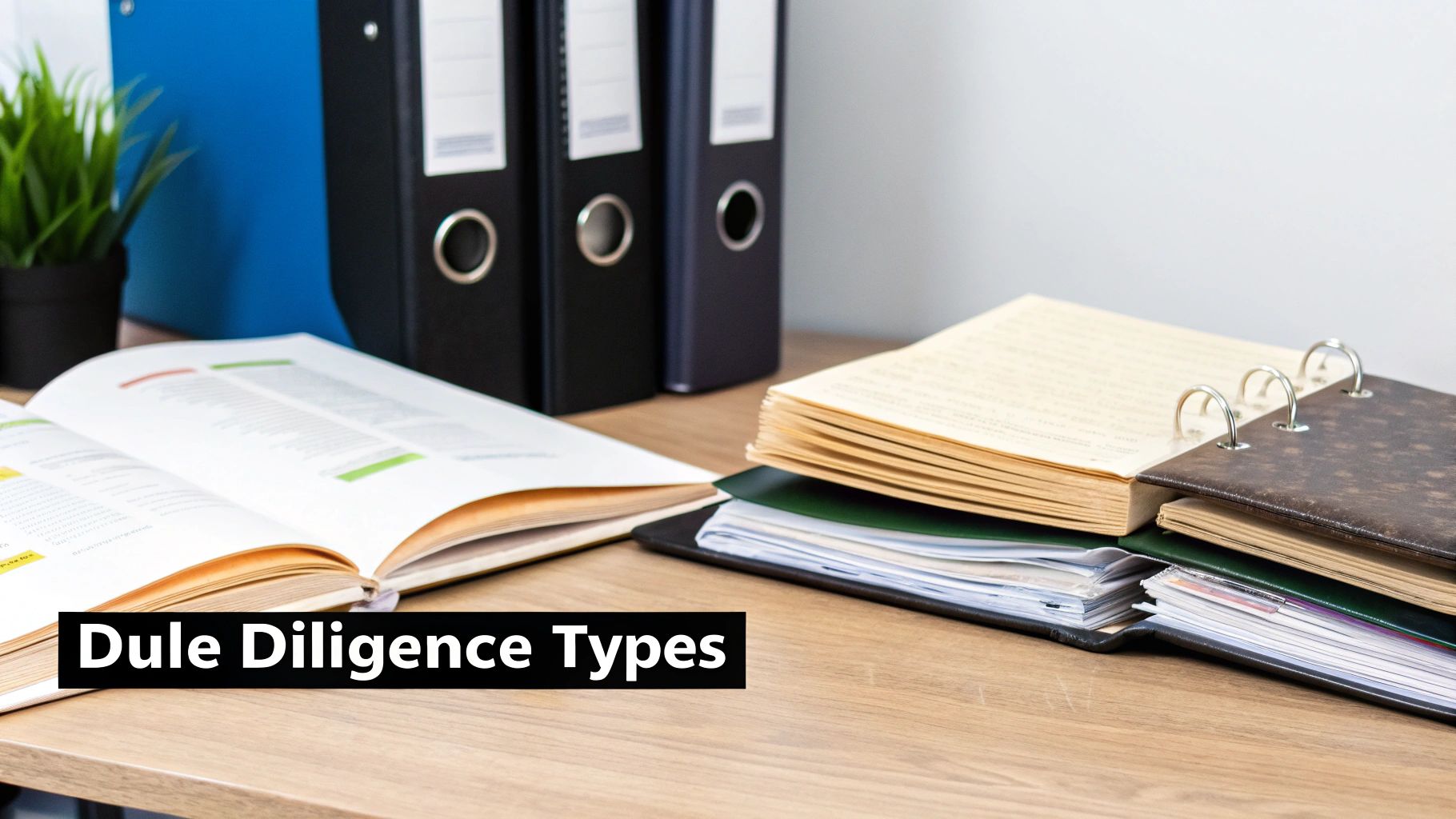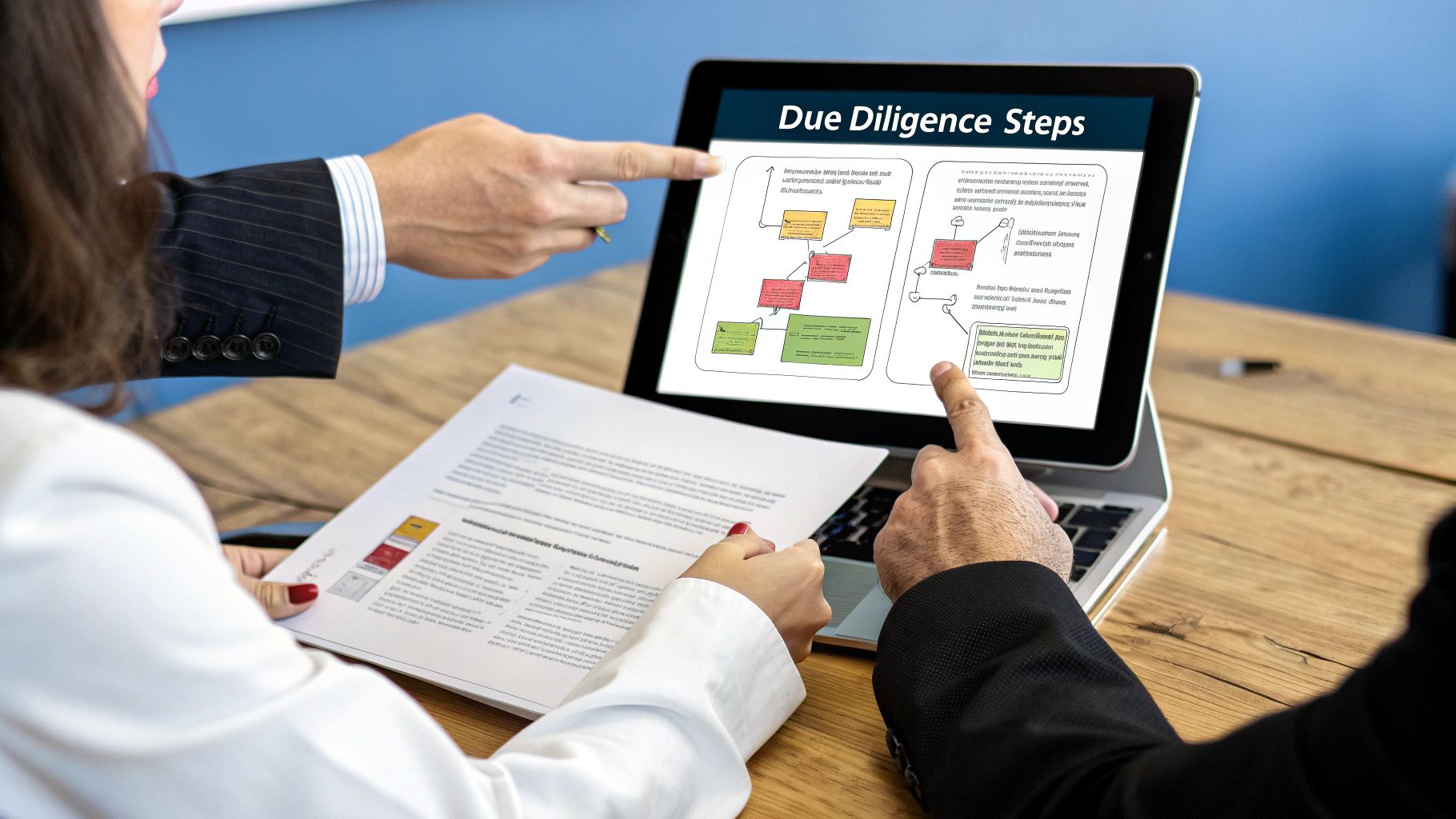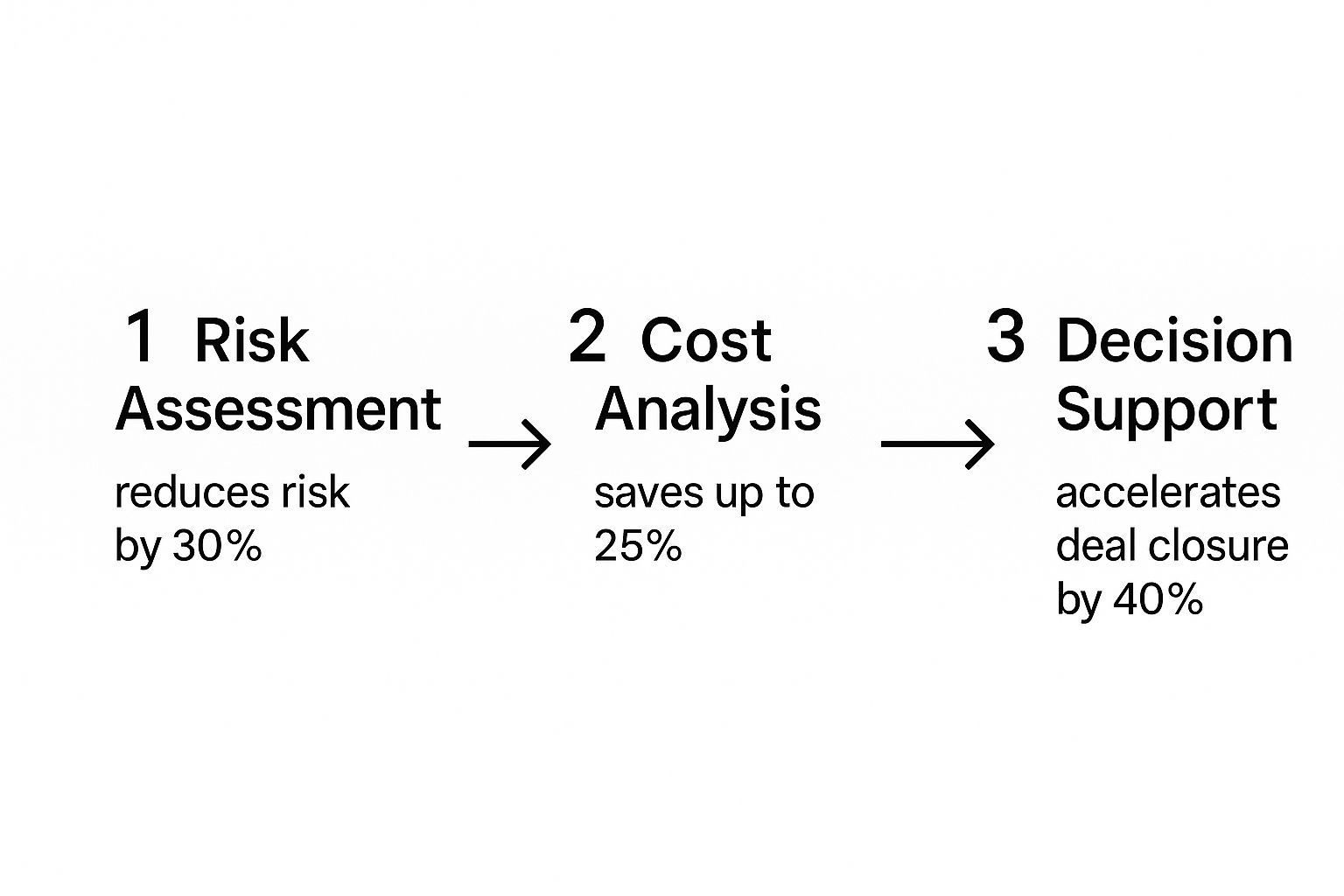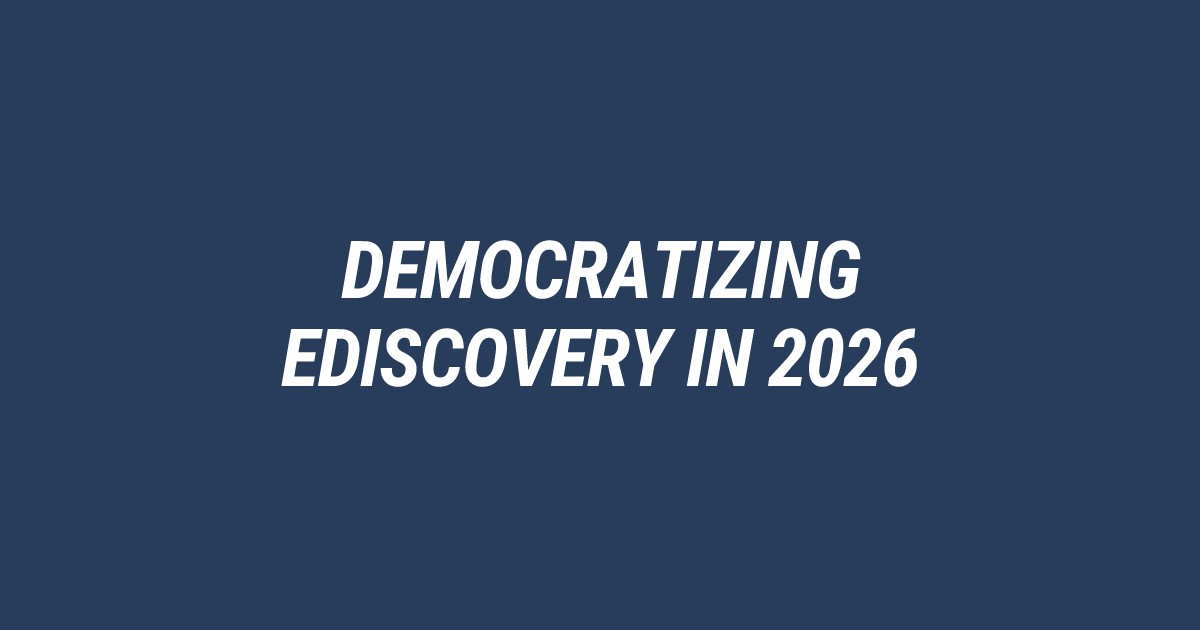Authored by Pablo Tascon
When you’re thinking about a major business deal—like buying another company, forging a partnership, or making a big investment—you’re really placing a bet on its future. A due diligence service is your way of making sure you aren't betting blind. It's a deep, investigative look under the hood to verify what you've been told, find hidden problems, and spot opportunities that aren't obvious from the outside.
What a Due diligence Service Really Does
Before you sign on the dotted line, you have to look past the sales pitch. Professional due diligence is about bringing in a team of specialists to act as your investigators, making sure you don’t walk into a deal with your eyes closed. It goes so much deeper than just scanning financial statements.
Think of it like buying a classic car you've always wanted. It looks incredible—fresh paint, polished chrome, the whole package. But you’re not a master mechanic. You’d bring in an expert to check the engine for hairline cracks, inspect the frame for rust hiding under the paint, and sift through the service records. That’s what a due diligence service does for a business deal. They’re there to tell you if you’re buying a gem or a beautifully disguised money pit.
Beyond the Balance Sheet
It’s a common mistake to think due diligence is just about the numbers. While financial health is obviously a huge piece of the puzzle, a real investigation covers a much wider territory to build a complete, 360-degree view of the company. The whole point is to answer the tough questions that protect your investment and give you leverage at the negotiating table.
This process involves a serious dive into several key areas:
- Confirming the Facts: Is the information you’ve been given actually true? A good due diligence team verifies everything from revenue streams and customer contracts to intellectual property claims.
- Uncovering Hidden Risks: They actively hunt for skeletons in the closet. This could be anything from pending lawsuits and regulatory headaches to operational weak spots that could blow up into expensive problems down the road.
- Identifying Untapped Opportunities: Sometimes, the investigation reveals good news. A thorough review might uncover undervalued assets, new market possibilities, or operational tweaks that the current owners have completely missed.
A due diligence service turns uncertainty into strategic intelligence. It’s not just about dodging bad deals; it’s about making good deals even better by giving you the clarity to negotiate from a position of strength.
It’s no surprise the demand for this kind of expert analysis is booming. The global due diligence services market is valued at around $50 billion in 2025 and is on track to hit an estimated $85 billion by 2033. This isn't just random growth; it’s fueled by a surge in M&A activity and the sheer complexity of modern business. If you want to dig deeper, you can read more about the due diligence market trends to see what’s driving this expansion.
Ultimately, a due diligence service delivers the confidence and insight you need to make smart, successful business decisions.
Exploring the Core Types of Due Diligence
Due diligence isn't a one-size-fits-all checklist. Think of a comprehensive due diligence service as a team of specialists, each examining a different, vital part of a business’s health. Understanding these distinct pillars is the key to seeing how the full picture comes together, making sure no stone is left unturned before you sign on the dotted line.
It's a bit like assembling a puzzle. Each type of due diligence provides a unique set of pieces—financial, legal, operational, and commercial. Only when you put them all together can you see the complete, unvarnished image of the company you're evaluating.

To give you a clearer idea of how these investigations fit together, here’s a breakdown of what each area covers and the critical questions it seeks to answer.
Key Areas of a Comprehensive Due Diligence Investigation
| Type of Due Diligence | Primary Focus Area | Key Questions Answered |
|---|---|---|
| Financial | The accuracy and sustainability of the company's financial records and performance. | Are the reported revenues real and repeatable? What are the true costs of doing business? Are future projections grounded in reality? |
| Legal | The company's legal structure, contracts, compliance, and potential liabilities. | Are there any hidden lawsuits or compliance fines waiting to surface? Do key contracts hold up under scrutiny? Is the corporate structure sound? |
| Operational | The efficiency and effectiveness of the company's day-to-day internal processes. | Can the business actually deliver what it promises? Are its systems, supply chain, and management team running smoothly? Where are the hidden inefficiencies? |
| Commercial | The company’s position in the broader market and its long-term viability. | Is there a real, lasting market for its products? How does it stack up against competitors? What do its customers really think? |
Each of these areas provides a different lens through which to view the business, and overlooking any one of them can leave you exposed to significant risk. Let's dig a little deeper into what each one entails.
H3: Financial Due Diligence
This is the one most people think of first, and for good reason. Financial due diligence is all about verifying that the numbers are both accurate and sustainable. It’s not just about glancing at a balance sheet; it’s about digging deep to scrutinize the quality of earnings, the accuracy of financial reporting, and whether future projections are anything more than wishful thinking.
The main goal here is to confirm that the company’s financial health is as solid as it seems. An expert team will pore over historical performance, cash flow statements, debt, and working capital to paint a realistic picture. This process stops you from overpaying for a business based on financial claims that don't hold up.
H3: Legal Due Diligence
While the numbers tell one story, a company's legal framework tells another that's just as important. Legal due diligence is an investigation into a company's legal standing, contracts, and compliance history to uncover potential liabilities that could become your problem after the deal closes.
This means a meticulous review of corporate records, customer and supplier contracts, employment agreements, and any ongoing litigation. Skipping this step is like buying a house without checking for property liens—you could inherit a massive legal headache you never saw coming.
A thorough legal review protects you from inheriting someone else’s problems. It identifies risks ranging from poorly written contracts to major compliance failures that could result in significant fines or lawsuits down the road.
H3: Operational Due Diligence
A company can have perfect financials and a squeaky-clean legal record, but if its day-to-day operations are a mess, it will never perform as you expect. Operational due diligence dives into the internal machinery of the business—its processes, systems, and people—to see if it can actually deliver on its promises.
This analysis looks at everything from the supply chain and manufacturing processes to the tech infrastructure and the management team’s real capabilities. It answers a simple question: does the engine actually run? Identifying operational weaknesses isn't just about spotting risks; it also uncovers opportunities for improvement that can add serious value post-acquisition. For instance, some businesses have seen a 73% increase in efficiency after streamlining operations identified during a thorough review.
H3: Commercial Due Diligence
Finally, even a perfectly run company is a bad investment if nobody wants what it's selling. Commercial due diligence evaluates the company’s place in the market to confirm its commercial viability for the long haul.
This involves analyzing the competitive landscape, understanding customer perceptions, and assessing the overall market size and growth trends. It's an outward-facing investigation designed to confirm that the company has a real, sustainable competitive advantage. Without this analysis, you risk investing in a business that's about to be steamrolled by stronger competitors.
By combining these four core types of investigation, a due diligence service provides a holistic, 360-degree view. This multi-faceted approach ensures that you're not just buying a company's past performance, but a predictable and profitable future.
Why Smart Businesses Never Skip Due Diligence
Making a major business decision without a professional due diligence service is like trying to navigate a minefield without a map. It’s a gamble where the potential losses far outweigh any perceived savings from cutting corners. Smart businesses get it: due diligence isn't just a defensive checklist. It’s a powerful strategic tool that unlocks value, dodges catastrophic risk, and lights up the path forward.
Investing in a thorough investigation goes way beyond just verifying numbers on a spreadsheet. It’s about gaining a deep, unvarnished understanding of a company's true health, its hidden operational weaknesses, and the latent liabilities that could absolutely derail your plans after the ink is dry. It turns assumptions into certainties and gives you the leverage to negotiate from a position of strength.

Uncovering Hidden Liabilities Before They Strike
Imagine a fast-growing tech firm acquiring a smaller competitor to grab more market share. Eager to close the deal, they chose a surface-level review, skipping a deep dive into regulatory compliance to save a little time and money. Months after the acquisition, they discovered the company they bought had been mishandling customer data for years, violating major privacy regulations.
The result? A multimillion-dollar compliance fine that completely wiped out the deal's expected ROI. This cautionary tale drives home a critical truth: what you don't know can and will hurt you. A proper due diligence service would have immediately flagged these compliance gaps, giving the acquirer the power to demand fixes before closing—or to walk away from a disastrous investment.
Turning Unseen Weaknesses into Strategic Wins
Now, let's flip the coin. Picture a manufacturing company looking to buy one of its key suppliers. During a comprehensive operational due diligence process, the investigative team uncovered major inefficiencies in the supplier's inventory management system. The seller saw this as a minor operational quirk. The buyer, however, recognized it as a massive opportunity.
Armed with this insight, the buyer successfully renegotiated the purchase price downward, arguing that significant capital would be needed to fix the systemic issues. After the acquisition, they rolled out a modern inventory system, slashed waste, and boosted profitability far beyond their initial projections.
Due diligence isn't just about finding problems; it’s about identifying potential. It provides the crucial intelligence needed to turn another company’s overlooked weaknesses into your future strengths.
These scenarios highlight the immense return you get from a quality due diligence service. It’s an essential investment in certainty, protecting you from crippling liabilities while uncovering opportunities that can completely redefine a deal's value.
The Growing Importance of Diligence in a Complex Market
As business deals get more intricate and global, the need for expert verification has skyrocketed. The U.S. due diligence services market, a key driver of global growth, was valued at USD 812 million in 2023. Projections show it expanding to USD 1.8 billion by 2032, an expansion fueled by rising cross-border investments and stricter regulatory landscapes.
This growth sends a clear message: professional diligence isn't optional anymore. If you want to dig deeper into this trend, you can explore the full market analysis of due diligence services.
At its core, a due diligence service provides a clear, objective assessment that empowers you to make informed decisions. It acts as your expert investigator, asking the tough questions and digging for the real answers. Ultimately, it confirms whether a deal is as good as it looks on paper or if there are critical risks hiding just beneath the surface. Smart businesses never skip this step because they know the cost of ignorance is always higher than the price of intelligence.
A Look Inside the Due Diligence Process
So, how does a professional due diligence service actually untangle a complex business and present a clear path forward? It's a structured journey, not a frantic search. The whole point is to move from broad questions to specific, actionable answers, turning what feels overwhelming into something manageable.
The process follows a logical flow, starting with a solid plan and ending with a comprehensive report. Each step builds on the last, guaranteeing a thorough investigation that leaves no stone unturned. This is what separates professional diligence from a simple document review.
Defining the Scope and Creating a Checklist
The very first step is figuring out what you need to know. What are the core questions this investigation must answer? A successful process kicks off with a detailed conversation to define the scope, making sure the entire effort aligns with the goals of the deal—whether it’s an acquisition, a partnership, or a major investment.
From there, a tailored due diligence checklist is created. This isn't some generic template pulled off the internet; it's a specific roadmap for the investigation. It lists every piece of information needed, from financial statements and customer contracts to intellectual property records and employee agreements. This keeps the process focused and organized from day one.
Secure Data Gathering and Expert Analysis
Once the checklist is ready, it's time to gather the information. This usually happens in a virtual data room (VDR), which is a highly secure online space where the target company uploads all the requested documents. Using a VDR keeps everything confidential and creates a clean audit trail of who looked at what and when.
With the data secure, the expert analysis begins. This is where specialists—in finance, law, and operations—really dig in. They don't just skim the documents; they scrutinize them, cross-reference facts, and verify everything. This is the stage where inconsistencies pop up, red flags get raised, and the real story behind the numbers starts to take shape. A key part of this is a deep dive into legal exposure, a process that shares principles with legal risk management in eDiscovery, where spotting potential liabilities early is everything.
This infographic shows how a structured process translates directly into better business outcomes, from slashing risk to closing deals faster.

As you can see, each step—from risk assessment to decision support—directly contributes to a more secure and profitable deal, accelerating closure by up to 40%.
On-Site Visits and Management Interviews
Reading documents will only get you so far. The next crucial phase brings the investigation into the real world with on-site visits and interviews with the target company’s key management. This human element provides context that spreadsheets and contracts never can.
These conversations are meant to fill in the gaps and test the assumptions made during the data analysis. It’s a chance to ask direct questions about operations, culture, and the company's vision for the future. Seeing the business environment firsthand and talking to the people who run it offers priceless insights you just can't get any other way.
A due diligence report is more than a summary of findings; it's a strategic document. It should not only identify risks but also provide clear, actionable recommendations on how to mitigate them or use them as leverage in negotiations.
The Final Report and Actionable Recommendations
Everything comes together in the final due diligence report. This document synthesizes all the findings from the data analysis, interviews, and site visits into a clear, concise summary. It gives you an unvarnished view of the target company's strengths, weaknesses, opportunities, and threats.
But a great report does more than just list problems—it provides actionable recommendations. For every risk that’s identified, it should suggest potential solutions or strategies to manage it. These recommendations empower you to make a final, informed decision, whether that means confidently moving forward, renegotiating the terms, or walking away from a deal that’s just too risky. This final step is what turns a simple investigation into a true strategic asset.
Understanding Customer Due Diligence and Compliance
While the due diligence we’ve covered so far often feels like a one-off sprint for a big deal, like a merger, there’s another kind of investigation that’s more like a marathon. It’s ongoing, legally required, and absolutely essential for many businesses.
This is Customer Due Diligence (CDD). It shifts the investigative lens from a target company to the customers you serve every single day.
Unlike M&A diligence with its clear start and finish, CDD is a constant cycle. For banks, fintech firms, and other regulated industries, this isn't optional—it's the law. CDD is the backbone of compliance with Anti-Money Laundering (AML) and Know Your Customer (KYC) rules, designed to stop illegal money from flowing through the financial system.
The core ideas of verification and investigation are the same, but here they're used to build and maintain trustworthy customer relationships. Get it right, and you're protected. Get it wrong, and you could face enormous fines, legal battles, and a damaged reputation that’s hard to fix.
The Core Pillars of CDD
At its heart, Customer Due Diligence answers one simple question: "Do we really know who we’re doing business with?" The process is built on three key activities that work together to give you a clear risk profile for every customer. A professional due diligence service specializing in this area will handle these steps methodically.
These activities are:
- Identity Verification: This is the first and most critical step. It’s all about confirming customers are who they claim to be by checking official ID documents against reliable, independent data sources. No guessing allowed.
- Risk Assessment: Not all customers are created equal when it comes to risk. This step involves looking at a customer’s profile—their job, where they live, and their expected transaction habits—to figure out their potential for getting mixed up in shady activities.
- Ongoing Monitoring: A customer's risk profile isn't set in stone. This final piece involves keeping an eye on their transactions and account activity. If something looks unusual or deviates from their normal pattern, it triggers a closer look.
CDD is not a one-time background check. It's an ongoing commitment to understanding your customers, designed to protect the integrity of the financial system and shield your business from becoming an unwilling participant in criminal activity.
A Growing Market Driven by Regulation
The need for solid CDD has fueled a massive and fast-growing global market. Valued at roughly USD 5.5 billion in 2023, the Customer Due Diligence service market is expected to nearly triple, hitting USD 15.2 billion by 2033. This surge is all thanks to tougher regulations worldwide and the ever-increasing sophistication of financial crime. You can learn more about the CDD service market's expansion and what’s driving it.
Ultimately, CDD takes the same principles of investigative rigor we use in big corporate deals and applies them to customer relationships. By proactively verifying, assessing, and monitoring customers, businesses can stay on the right side of the law, dodge devastating penalties, and build a more secure and trustworthy operation from the ground up.
How to Choose the Right Due Diligence Partner
Picking the right partner for a due diligence service is every bit as critical as the investigation itself. This isn't a decision to take lightly. It directly shapes the quality of the insights you get and, ultimately, how confident you are in your final decision. The goal is never just to find the cheapest option; it's to find a team that delivers rigorous, insightful, and actionable analysis.
Think of it like hiring a skilled detective for a high-stakes case. You wouldn't just pick the first person who walks through the door. You’d look for someone with specific experience, a proven track record, and the right tools to uncover the truth. The same logic applies here—the right partner can be the difference between a successful transaction and a very costly mistake.

Evaluating Potential Partners
When you start vetting potential providers, focus on a few key criteria that separate the exceptional from the merely average.
First up, deep, industry-specific expertise is non-negotiable. A team that already understands the unique challenges and nuances of your sector will spot red flags that a generalist might completely miss.
Look for a firm with a strong track record and ask for verifiable case studies or references. Don't be shy about inquiring about their technological capabilities, either. Modern due diligence leans heavily on data analytics tools to process massive amounts of information efficiently and accurately.
A partner’s true value is measured by their ability to provide clarity. They should turn complex data into a clear narrative, empowering you to negotiate effectively and move forward with certainty.
Key Questions to Ask a Provider
To really get a feel for a potential partner’s competence and approach, you need to ask targeted questions that go beyond their sales pitch. Arm yourself with a checklist to make sure you cover all the critical areas before signing on the dotted line.
Here are a few essential questions to get the conversation started:
- Experience: Can you share an example of a critical red flag you uncovered for a client in our industry?
- Process: How do you approach unexpected challenges or discoveries during an investigation?
- Team: Who will be the key people working on our engagement, and what is their specific expertise?
- Reporting: What does your final deliverable look like, and how do you present actionable recommendations?
- Contracts: How do you handle complex legal documents and agreements? A partner's proficiency is often reflected in their knowledge of contract management best practices.
Asking these questions helps reveal their problem-solving skills, their level of transparency, and whether their approach actually aligns with your needs. The right partner won't just answer these confidently—they'll also ask insightful questions about your business and goals, showing a genuine interest in your success.
Common Questions About Due Diligence Services
Even when the basics of due diligence are clear, some practical questions always come up before starting a professional review. Getting these common queries answered upfront helps you move forward with confidence, knowing exactly what to expect.
Let's clear up a few of the most frequent sticking points.
How Long Does Due Diligence Take?
There’s no single answer here—the timeline for an investigation varies wildly. A straightforward review of a small, local business might only take a few weeks. In contrast, a deep-dive analysis for a complex international merger could easily stretch across several months.
The duration really boils down to the company’s size, the deal's complexity, and just how deep you need to dig. The key is to work with your provider to set a realistic timeline right from the start.
Is All Information Kept Confidential?
Absolutely. Confidentiality is the bedrock of any due diligence engagement. The entire process is legally shielded by a Non-Disclosure Agreement (NDA), which is signed before a single document is shared.
This legal framework binds the due diligence provider to protect all the sensitive data they access. To back this up, secure virtual data rooms are used to manage and track every document, ensuring a high level of security and discretion throughout the investigation.
What Is the Typical Cost of a Due Diligence Service?
There’s no "one-size-fits-all" price tag for due diligence. The cost depends entirely on the company's scale, its industry, geographic footprint, and how many types of diligence are needed (financial, legal, operational, and so on). The use of advanced tools can also be a factor, and it's smart to understand the ethical considerations of using AI for legal review as part of the process.
While it is a significant investment, the cost should always be weighed against the massive financial risk of jumping into a deal based on flawed or incomplete information. Most providers will give you a detailed quote after an initial scoping call.
At Tascon Legal & Ediscovery, we specialize in providing the clarity and insight you need for your most critical legal and business operations. From complex document reviews to implementing the right e-Discovery tools, we offer end-to-end support that saves time and reduces risk.
Learn more about how we can support your organization at Tascon Legal & Ediscovery










